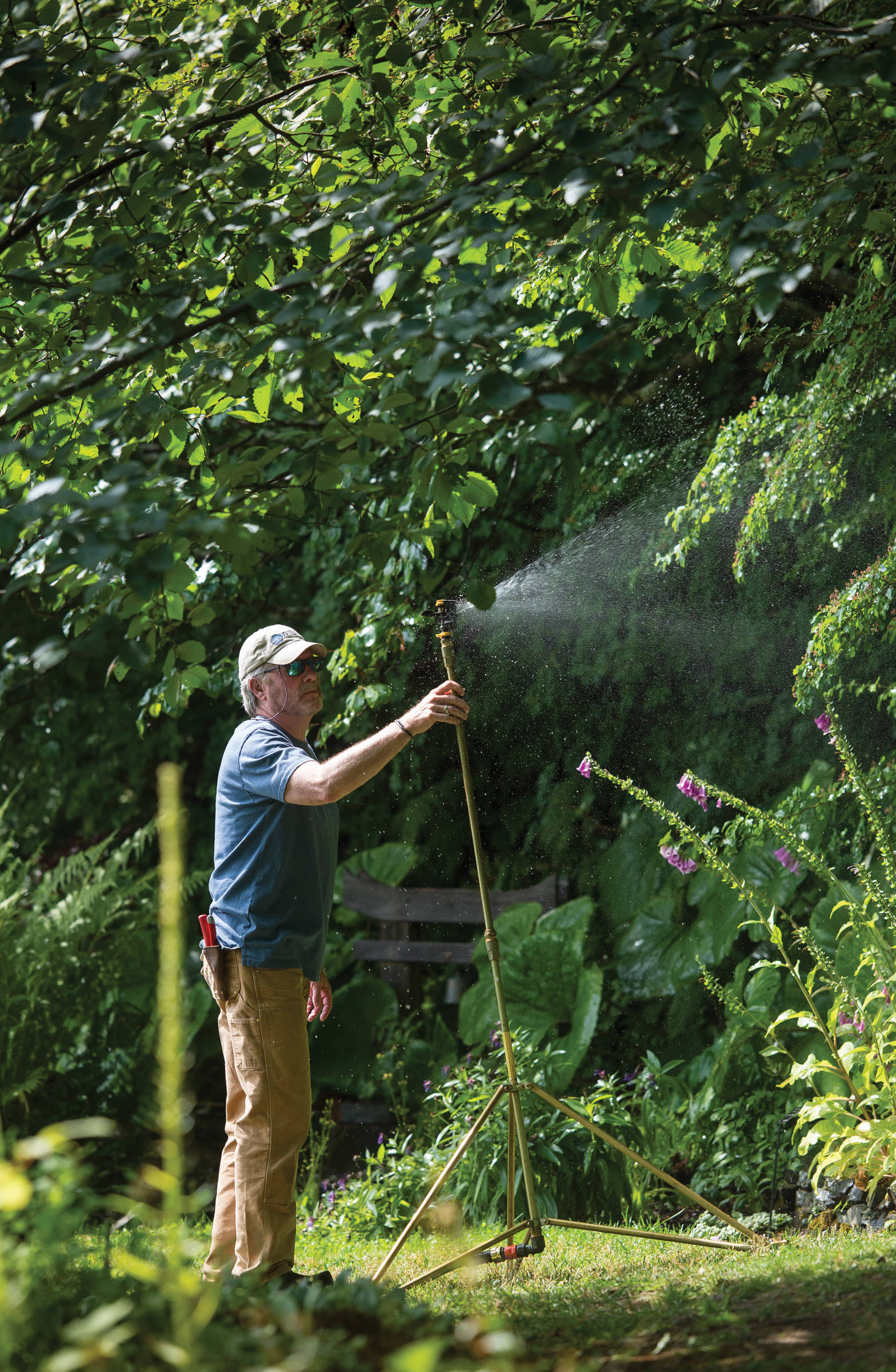The sun is shining, the weather is warm, and conditions are absolutely lovely at the Jensen-Olson Arboretum.
That means manager Merrill Jensen isn’t having much fun.
“When it’s sunny and everyone’s like, ‘Oh, this is great!’ I’m like, it’s a lot more work,” he said Wednesday.
For more than a week, not a single drop of rain has fallen at Juneau International Airport, the capital city’s official measuring point. Over at the National Weather Service office in the Mendenhall Valley, workers had to blow cobwebs out of the rain-collection can on Wednesday morning.
For Jensen, that means his hose — and his alarm clock — is getting a lot of work. The arboretum’s watering system isn’t automated, and so every two or three hours, he has to move sprinklers and hoses across its three acres of cultivation.
“It takes four days to go from end to end, and that’s going around the clock,” he said.
Every evening, he sets down a sprinkler, goes to bed, then wakes up at 11 p.m. and moves it again. He goes back to sleep and wakes up at 2 a.m. to do the same. Then comes 4 a.m. Then 6 a.m. After one final doze, it’s back to the normal day.
“It’s like having a newborn baby,” he said.
Jensen might be the only person in Juneau who isn’t utterly enjoying the warmest summer since 2009.
Through the end of Wednesday, there have been 17 days with temperatures of 70 degrees or higher at the airport. Over the past 50 years, the average is 19.
Within those 17 days, there have been six that topped 80 degrees. The average is two per summer; this year has had the most since 2009.
After several years of summers that finished cooler and wetter than normal, summer 2018 is running almost on par when it comes to rainfall.
Through Wednesday, the capital city has seen 24.89 inches of precipitation (rain and melted snow) this year. That’s only a fraction below the 26.47 inches that’s normal for this point in the year.
Forecasters, however, have their eyes on the long-term forecasts, which call for more dry and warm weather.
Autumn is Southeast Alaska’s wettest season, the “reservoir-filling season,” said Rick Thoman, climatologist at the National Weather Service in Anchorage.
If dry weather continues through August, it might be time to start worrying, said officials at the Weather Service.
Southern Southeast Alaska is already in “moderate drought,” with one fish dieoff near Petersburg and electric utilities on Prince of Wales Island using diesel power because their hydro reservoirs are too low.
“We have probably the lowest lake level on record for this time of year,” said Cody Schwegel of Alaska Power and Telephone, which operates power plants on that island. “We’ve never seen it this low in July.”
“Praying for rain,” he said.
In northern Southeast, conditions are “abnormally dry,” with no large-scale detrimental effects aside from a run on sunscreen.
“You may not see many impacts from it; it’s more of a precipitation deficit,” explained David Miskus, a meteorologist with the National Weather Service’s Climate Prediction Center on the East Coast.
If there’s 40 inches of rain instead of 60, it’s not that big of a deal, he said. Local weather service hydrologist Aaron Jacobs offered similar thoughts.
Alaska Electric Light and Power vice president Debbie Driscoll said all of Juneau’s reservoirs are at or above their expected levels, and Snettisham, thanks to a freak of local climate, has actually seen above-normal rainfall this month. (Two days alone combined for almost five and a half inches of rain there.)
While forecasters predicted a slight chance of rain overnight Wednesday into Thursday morning, it wasn’t expected to amount to much more than sprinkles before pleasant conditions returned.
“We’re expecting to see these kind of conditions to persist, at least through next week,” Jacobs said. “The next big weather maker doesn’t seem to be moving into the panhandle until sometime late next week.”
At the arboretum, Jensen is looking forward to it.
“Back to normal Juneau weather,” he said.
• Contact reporter James Brooks at jbrooks@juneauempire.com or 523-2258.

